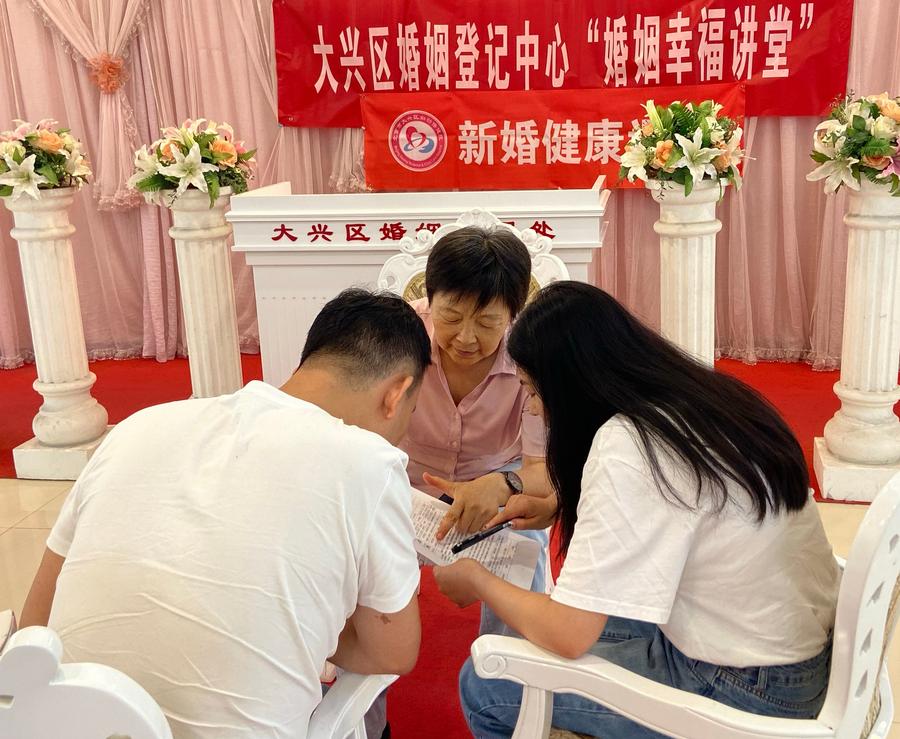Fewer young people tying the knot as perceptions of marriage change


China recorded 1.81 million marriage registrations in the first quarter of this year, marking an 8 percent drop from the same period last year, according to data from the Ministry of Civil Affairs.
After nine consecutive years of decline, China's marriage registration numbers saw a brief rebound in 2023. However, the downward trend resumed in 2024, with registrations falling to their lowest level since 1980.
Experts attribute this general drop to a shrinking population of people in the age range suitable for marriage, changing perceptions of marriage and financial concerns associated with getting married.
"In the 1980s, more than 20 million people were born each year in China, but since 2000, that number has dropped to just over 10 million annually. So naturally, the base number for marriage registrations is much lower now," said Jiang Quanbao, a professor at the institute for population and development studies at Xi'an Jiaotong University in Northwest China's Shaanxi province.
Li Ting, a population expert at Renmin University of China in Beijing, noted that higher levels of education and a growing sense of individualism have combined to significantly challenge traditional views on marriage.
"Nowadays, master's students are already 25 or 26 by the time they graduate, and PhD graduates are usually close to 30 — even older if they spend a few years working first," said Tan Kejian, a researcher at the Shanxi Academy of Social Sciences in North China.
"In the past, young people often got married around the time they graduated or started working, but now many won't consider marriage until they're planning to have children," Li added.
Also, for some young people, staying single is a conscious choice.
As one user on microblogging platform Weibo put it: "If I were married, there's no way I'd enjoy the kind of freedom I have now." Another commented: "If I can't find the right person, I'd rather stay single than settle."
Others active on Weibo pointed to life pressures, noting that raising a child can be exhausting and often requires the whole family including their parents to be involved.
Sociologist Li Yinhe believes the growing number of single individuals is closely tied to China's ongoing urbanization and modernization processes.
"In the past, women who didn't marry often had no means of supporting themselves. But today, women are fully capable of earning a living on their own and no longer need to rely on men. As a result, the desire to marry has dropped significantly compared to earlier times," she said.
While Chinese society has grown more accepting of people living alone, the drop in marriage rates has also led to falling birth rates — a trend that is sparking increasing concern.
Wedding incentives
In response to these changes, authorities across China have introduced various incentives to foster a newlywed-friendly society.
Earlier this month, the government revised its marriage registration rules, reducing paperwork and giving couples more flexibility to choose where to register their union. The new regulations will take effect on May 10 this year.
Some areas have already begun offering incentives to encourage marriage. In one village in Guangzhou, South China's Guangdong province, newlywed couples can apply for a bonus of up to 40,000 yuan ($5,490), while the city of Lyuliang in North China's Shanxi province offers 1,500 yuan to women who marry at or under the age of 35. In addition, eastern Zhejiang province has extended its paid marriage leave from three to 13 days.
China is also offering increasing comfort and convenience to single young adults — as a "singles economy" quietly takes shape.
Restaurants are introducing single-serving meals, the market for single-person apartments is booming, and compact home appliances and kitchenware are gaining increasing popularity.
There's even growing demand for services like customized solo travel and one-person wedding photo shoots.
Li Ting noted that over the past three decades, the rate of people choosing to remain single for life in countries like South Korea and Japan has steadily increased, a trend that may well reflect the future of marriage in China.
Xinhua
- BRI annual Chinese character unveiled in SW China's Chongqing
- Hunan's Huaihua promotes its cultural cuisine
- Confucius' hometown celebrates the philosopher's birth anniversary
- China approves first Chikungunya virus detection kit
- Fujian Coast Guard organizes fleets to strengthen law enforcement patrols
- China re-elected as Category One member by global civil aviation body





































